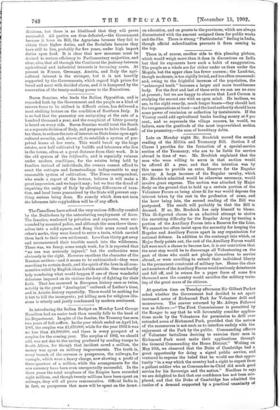Late on Monday night Mr. Brodrick moved the second reading
of the Militia and Yeomanry Bill. Section 3 of Clause 1 provides for the formation of a special-service section of the Yeomanry, who are to be liable for service abroad in time of war. Mr. Brodrick explained that the men who were willing to serve in that section would be offered £5 a year, and that the intention was by this means to provide an extra Reserve for the Regular cavalry. A large increase of the Regular cavalry, which Mr. Brodrick admitted would be otherwise necessary, would involve great expense. The section was attacked by Major Seely on the ground that to hold up a certain portion of the Volunteer Forces as being alone fit for war would depress the interest taken by the rest in the profession of arms, and the hour being late, the second reading of the Bill was postponed. The result will probably be that the Bill is doomed. If so, Mr. Brodrick has only himself to blame. This ill-digested clause is an admitted attempt to shelve the recruiting difficulty for the Regular Army by turning a portion of the Auxiliary Forces into a Reserve for the Line. We cannot too often insist upon the necessity for keeping the Regular and Auxiliary Forces apart in any organisation for national defence. In addition to the contempt into which, as Major Seely points out, the rest of the Auxiliary Forces would fall were such a clause to become law, it is our conviction that the next step would be to discourage all Volunteering on the part of those who could not pledge themselves to service abroad, or were unwilling to submit their individual liberty to the permanent constraint of military law. Hence the class and numbers of the Auxiliary Forces would seriously deteriorate and fall off, and in return for a paper force of some five thousand men the country would sacrifice the military train- ing of the great mass of its citizens.






















































 Previous page
Previous page